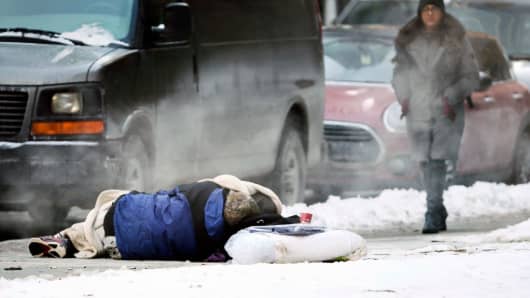For the 35 long days when the government was shutdown, as 800,000 federal workers went without pay, many struggled to stay afloat and feed their families, uncertain when they would find economic stability.
"It's a little embarrassing," one woman who was furloughed from her job at the Department of Homeland Security said on a local news broadcast. "You're working and you have to come to a food bank. But at the same token, I'm not ashamed. It's the people in Washington D.C. are the ones who should be ashamed."
As the CEO of Robin Hood, the largest anti-poverty nonprofit in New York City, I watched with pride as anti-poverty interventions we fund stepped up to meet this unexpected crisis.
The Food Bank for New York City, whose work we have supported for 30 years, turned the Barclays Center in Brooklyn — a sports arena — into a food pantry to support federal employees.
Another of our community partners, the West Side Campaign Against Hunger, saw a 40 percent increase during the shutdown in the number of people they served at their 86th Street Market in New York City, relative to the year before.
But beneath the stories of humanity, generosity, and community, the shutdown showed us how so many Americans who we might think were financially stable — federal employees — had to turn to soup kitchens, food pantries, and emergency loans after just two missed paychecks.
These were not isolated incidents. Families slipping in and out of poverty pervades modern American society.
According to comprehensive new data from the Prosperity Now Scorecard, a staggering 40 percent of American households live one missed paycheck away from poverty. That population of proud, hardworking Americans who we used to call the great American middle class are one unexpected expense, one layoff, one medical emergency, one missed paycheck, one government shutdown away from poverty.
For generations, poverty in American has been a persistent plague on our society. What the data and the realities in communities are showing us now is that we're on the verge of it becoming a permanent inescapable reality.
In my life, the improbability of my journey reminds me what's at stake. I grew up on that slippery precipice of poverty in Baltimore and the Bronx in the 1980s and 90s.
Widowed at 31 when my father died from a rare virus, my mother quietly and humbly shouldered the burden of being a single mom, and the economic challenges that come along with it. Throughout my childhood, she worked part-time, low-wage jobs — usually more than one at a time — as she struggled to support my sisters and me.
That all changed in 1993, when she got a job at a nonprofit. For my family, it changed everything. It gave us stability, health insurance, consistency, and consequently — upward mobility.



